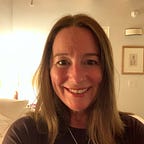Why We Need Books More Than Ever
It is only a slight exaggeration to say that reading saved my life. I was born prematurely, with undeveloped lungs, and I was not expected to survive. In the middle of the night — this was February, in Maryland — I was taken by helicopter to a bigger hospital and put into an incubator. When I survived, I was not expected to develop intellectually. So my mother read to me. She read to me day after day, and I feel like all of this reading must have saved my mind.
During my childhood, I read like a parched person seeking water. I read under the covers by flashlight. I read lying down in the very back of my parents’ Oldsmobile station wagon, in the era before seat belt laws. Once, a teacher caught me reading during her lesson and made me write “I will pay attention in class” a thousand times as punishment.
I read because reading made me feel understood. I had friends in real life, and a family who loved me, but somehow I still felt out of place in the world. Writer Alain De Botton contends that even the people who love us the most do not know us the way we want to be known. He claims that books are “friends waiting for us any time we want them, and they will always speak honestly about what really matters.”
Books were also a means of escape: from boredom, and to be honest, from other people. I like to be alone, and I think a lot of other people feel that way, too, even if we don’t always admit it. Today, people try to find escape in their phones, but the phones only create more intrusion. They tempt us with shiny objects, encouraging us to buy more, be better, look better. Online, I am surrounded by other people’s voices and opinions, but I am lost to myself. When I am reading, I am in a state of pure solitude, yet I am never lonely. I feel connected to the heart of the writer and to every single other person, living and dead, who ever read and loved that book.
But perhaps the biggest reason to read books is because of what the Internet has done to us. The Internet has trained our brains to frantically skim and click, to seek the quick hit, to be endlessly distracted. Many of my students tell me they can’t sleep at night because their minds are racing. Nothing calms a racing mind like a book. Reading a book demands that we block out all other thoughts and focus. In that way, it is a meditation, a fight against the colonization of our attention.
Some of my friends have told me that reading is harder for them now. They tell me they have lost their ability to focus on longer works. I feel that, too. I remember the days when I used to carry around Tolstoy’s War and Peace with me, just to dip into when I was waiting in line at the grocery store. The book was four inches thick, so I cut it in half to make it easier to carry. Now I can only read at home, in a quiet place. Will the next generation still be able to read? I worry that if we stop reading books, we might lose our ability to concentrate, and with that, we might lose the ability to process difficult information or sustain a prolonged endeavor.
Our current president doesn’t read, unless you count Twitter and news feeds, and this tells you everything you need to know about him. He is reactive, not thoughtful; hateful, not empathetic. He shouts instead of listening. He sees everything through the tiny, dirty window of his own desires. He is our future, if we stop reading.
Literature, in particular, teaches us about love, about kindness, about seeing things through the eyes of another. Franz Kafka says that a book is “the axe for the frozen sea inside of us.” Rebecca Solnit claims that “a book is a heart that only beats in the chest of another.” Books show us our essential interdependency regardless of gender, culture, and generation.
And this leads to the biggest reason why I want to give all of my students a book. Our worlds are too limited, too narrow, to contain all that we can be. Sometimes a great book can fling open a door that we didn’t know was closed. Sometimes it’s a door to a new way of living. Reading The Razor’s Edge by Somerset Maugham gave me the courage to live unconventionally. I married later in life, to someone I really love, and we chose not to have children but instead to find meaning in creating a handmade home full of art, books, plants, and little dogs. When you see someone quietly reading, it may seem as though she is doing nothing, but she is doing everything. Doors are wildly swinging. Wind is nearly blowing the roof off. The reader is poised, ready for the next word, the next idea, the next path.
